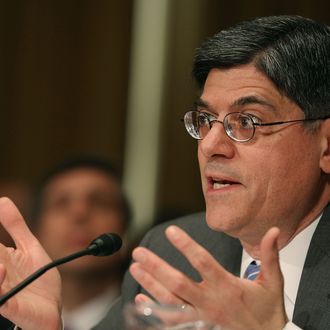
“Probably not” is the short answer.
But the longer answer is there is indeed something odd, to the untrained eye, about the revelation that likely next Treasury secretary Jack Lew had a contractual agreement with Citigroup, where he worked from 2006 to 2008, that guaranteed he would get to keep his bonus payment in the event that he left the bank to take “a full-time high level position with the United States government or regulatory body.”
Various people have taken this odd contractual clause as evidence of a vast Citigroup conspiracy, whereby the bank rewards its employees for zooming through the revolving door to Washington, where presumably they will continue to do Citigroup’s bidding in a shadowy, unofficial capacity.
Now, perhaps I’m being too charitable here, but I don’t read much between the lines of Lew’s Citigroup contract, other than that he’s a fairly skilled negotiator who was able to get himself a beneficial clause in his contract.
First, it’s useful to clarify: Jack Lew didn’t get a “bonus” for leaving Citigroup to go to the public sector. There was no extra money involved. Instead, by taking a high-ranking government job, Lew simply got to keep the bonus money he had already been paid. Several other circumstances would have allowed him to keep that money even if he left Citigroup. They included “a significant reduction in your title/function or responsibilities” and “a relocation of your principal place of employment to a location that is not within a commutable distance in the New York City area.” All that was notable about Lew’s contract is that it put acceptance of “a full-time high level position with the United States government or regulatory body” on the list of circumstances under which it was okay for him to leave without forfeiting his bonus.
So, why did it do that? After reading Jonathan Weil’s column and looking at the first three pages of Lew’s employment agreement, the most likely chain of events I can think of is this: Lew was a longtime D.C. budget wonk who, in 2006, was taking a break from the public sector and wanted to make a lot of money for a few years before going back to Washington. Lew’s old mentor Robert Rubin got him a job at Citigroup that paid $300,000 per year, plus a guaranteed bonus of at least $400,000 that would be prepaid for his first year on the job.
Most high-level Wall Street jobs come with pretty severe restrictions on what happens to your deferred compensation if you decide to leave. And since Lew’s money was being paid up front, the bank had a vested interest in making sure he stuck around for the entirety of 2006 and didn’t go work at Goldman Sachs or a hedge fund down the street.
But Lew, who spent the vast majority of his career in government, likely knew he was never going to stay at Citigroup forever — he was only using the bank as a short-term, high-paying stopover. So it behooved him to make sure that he wasn’t subject to the same rules as other Citigroup employees. If the opportunity to move back to the public sector presented itself — say, if Ben Bernanke dropped dead and Lew was offered the Fed chairmanship — he wanted to be able to take the job without losing all of his Citigroup bonus money. So it may be that Lew — who was a major hire for Citigroup and thus had negotiating leverage — was just looking out for himself, and that the “high level position with the United States government” contract clause was his idea, not Citigroup’s.
Now, let me add the caveat that even if Citigroup did come up with the clause, as a way to reward Lew for getting a post in the U.S. government, it doesn’t necessarily mean there’s a scandal. Banks have all kinds of reasons for rewarding people who take high-level positions in the government. Only one is “because they’ll give us preferential treatment when they’re in charge of regulating us/bailing us out.” Another is “because it’s prestigious, and it makes us look good to have the next secretary of X come from our firm, and not our rival.” A third is “because we believe in the high-minded notion of statesmanship, but government jobs pay so badly compared to Wall Street that no banker would ever take them if we didn’t somehow make it financially easier.”
That third justification sounds weird, but keep in mind that the government is also in the business of making it easier for rich investors to take high-ranking government positions without paying a major price, through federal ethics laws that allow them to avoid paying capital gains taxes on securities they are required to sell as a condition of their government jobs. (Hank Paulson, for example, legally avoided paying approximately $200 million in capital gains taxes on his Goldman Sachs stock when he left Goldman to become Treasury secretary — a job that required that he not have a financial stake in Goldman.)
So, when it comes to Jack Lew’s Citigroup contract, there seem to be a couple choices for interpretation: Option A is that Lew was a savvy negotiator with sufficient leverage to get a clause in his contract that prevented him from being punished financially for going back to government, a thing he wanted to do anyway. Option B is that Citigroup, like other banks (and the federal government!), likes to reward people who sacrifice some of their financial comfort to head into the public sector as a matter of principle, and so gave Lew a preferential contract clause that would let him keep his bonus money if he left. Option C is that Citigroup came up with a scheme whereby it would give Lew a bounty for getting an important government job, on the theory that he would remember the favor the next time it came to bail out the banks.
Maybe my Occam’s razor is broken, but I don’t see Option C as the likeliest of the three scenarios. But again, it’s possible I’m being too charitable.





























